|
A bicycle, often called a
bike (and sometimes referred to as a
"pushbike", "pedal bike", "pedal
cycle", or "cycle"), is a human-powered, pedal-driven, single-track vehicle, having two wheels attached to a frame, one behind the
other. A person who rides a bicycle is called a cyclist, or bicyclist.
Bicycles were introduced in the 19th century and now number more than one billion worldwide, twice as many as
automobiles. They are the principal means of transportation in many regions. They also provide a popular form of recreation, and have been adapted for such uses as children's toys, adult fitness, military and police applications, courier services and bicycle racing.
The basic shape and configuration of a typical upright bicycle has changed little since the first chain-driven model was developed around
1885. However, many details have been improved, especially since the advent of modern materials and computer-aided design. These have allowed for a proliferation of specialized designs for diverse types of cycling.
The invention of the bicycle has had an enormous impact on society, both in terms of culture and of advancing modern industrial methods. Several components that eventually played a key role in the development of the automobile were invented for the bicycle, including ball bearings, pneumatic tires, chain-driven sprockets, and spoke-tensioned
wheels.
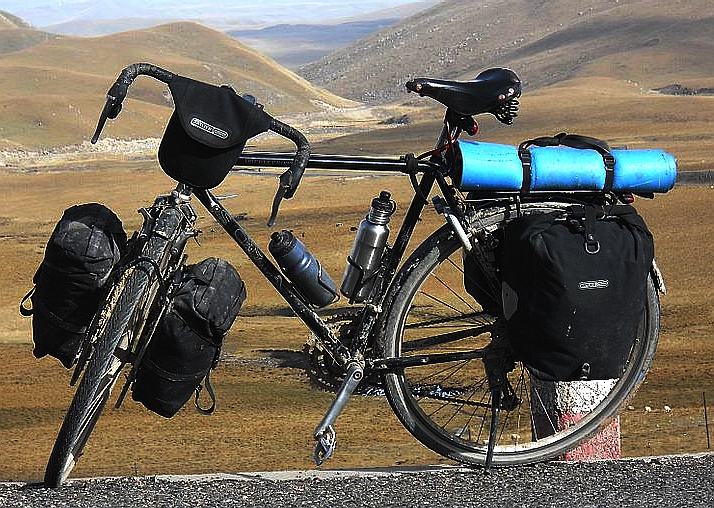
Etymology
The word bicycle was coined by the Belgian newspaper La Gaulois in the
1890s. Before that, and in some places thereafter, bikes were known primarily as velocipedes.
History of the bicycle
Wooden draisine (around 1820), the first two-wheeler and as such the archetype of the
bicycle
The dandy horse, also called Draisienne or laufmaschine, was the first human means of transport to use only two wheels in tandem and was invented by the German Baron Karl von Drais. It is regarded as the forerunner of the modern bicycle and was introduced by Drais to the public in Mannheim in summer 1817 and in Paris in
1818. Its rider sat astride a wooden frame supported by two in-line wheels and pushed the vehicle along with his/her feet while steering the front wheel.
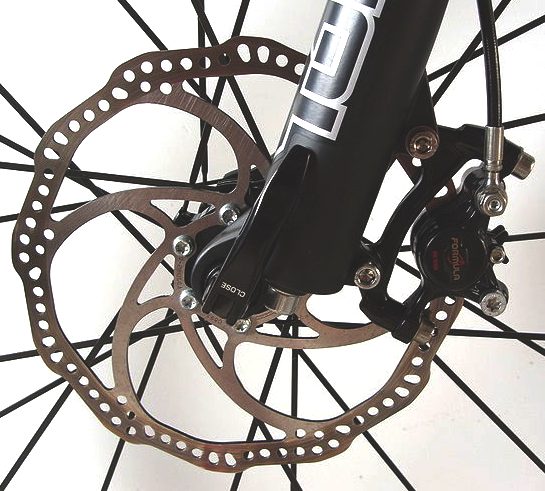
Michaux' son on velocipede 1868
Thomas McCall in 1869 on his velocipedeThe first mechanically-propelled 2-wheel vehicle may have been built by Kirkpatrick MacMillan, a Scottish blacksmith, in 1839, although the claim is open to
dispute. He is also associated with the first recorded instance of a cycling traffic offence, when a Glasgow newspaper in 1842 reported an accident in which an anonymous "gentleman from Dumfries-shire... bestride a velocipede... of ingenious design" knocked over a little girl in Glasgow and was fined five
shillings.
In the early 1860s, Frenchmen Pierre Michaux and Pierre Lallement took bicycle design in a new direction by adding a mechanical crank drive with pedals on an enlarged front wheel (the velocipede). Another French inventor by the name of Douglas Grasso had a failed prototype of Pierre Lallement's bicycle several years earlier. Several inventions followed using rear-wheel drive, the best known being the rod-driven velocipede by Scotsman Thomas McCall in 1869. The French creation, made of iron and wood, developed into the "penny-farthing" (historically known as an "ordinary bicycle", a retronym, since there was then no other
kind). It featured a tubular steel frame on which were mounted wire-spoked wheels with solid rubber tires. These bicycles were difficult to ride due to their high seat and poor weight distribution. In 1868 a Michaux cycle was brought to Coventry, England by Rowley Turner, sales agent of the Coventry Sewing Machine Company (which soon became the Coventry Machinist Company). His uncle, Josiah Turner, together with business partner James Starley used this as a basis for the 'Coventry Model' in what became Britain's first cycle
factory.
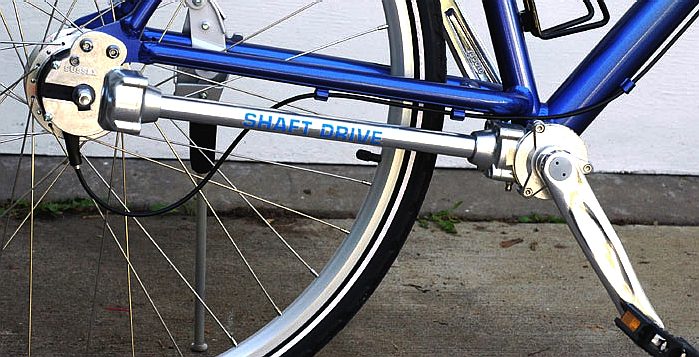
A penny-farthing or ordinary bicycle photographed in the Škoda Auto museum in the Czech Republic
Bicycle in Plymouth, England at the start of the 20th centuryThe dwarf ordinary addressed some of these faults by reducing the front wheel diameter and setting the seat further back. This necessitated the addition of gearing, effected in a variety of ways, to efficiently use the power available. Having to both pedal and steer via the front wheel remained a problem. J. K. Starley (nephew of James Starley), J. H. Lawson, and Shergold solved this problem by introducing the chain drive (originated by the unsuccessful "bicyclette" of Englishman Henry
Lawson), connecting the frame-mounted cranks to the rear wheel. These models were known as dwarf safeties, or safety bicycles, for their lower seat height and better weight distribution (although without pneumatic tires the ride of the smaller-wheeled bicycle would be much rougher than that of the larger-wheeled variety). Starley's 1885 Rover, manufactured in Coventry,
England, is usually described as the first recognizably modern bicycle. Soon, the seat tube was added, creating the double-triangle diamond frame of the modern bike.
Further innovations increased comfort and ushered in a second bicycle craze, the 1890s' Golden Age of Bicycles. In 1888, Scotsman John Boyd Dunlop introduced the first practical pneumatic tire, which soon became universal. Soon after, the rear freewheel was developed, enabling the rider to coast. This refinement led to the 1890s
invention of coaster brakes. Derailleur gears and hand-operated cable-pull brakes were also developed during these years, but were only slowly adopted by casual riders. By the turn of the century, cycling clubs flourished on both sides of the Atlantic, and touring and racing became widely popular.

Bicycles and horse buggies were the two mainstays of private transportation just prior to the automobile, and the grading of smooth roads in the late 19th century was stimulated by the widespread advertising, production, and use of these
devices.
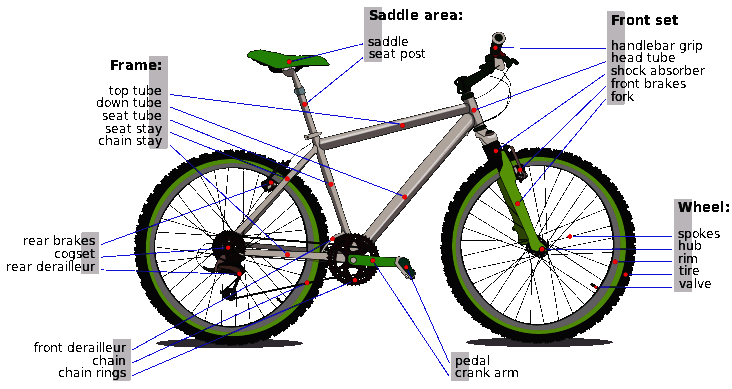
Diagram
of main cycle components
|
Crazy
Mountain bike trail
- Youtube
|
Super
crash wipe out - Youtube
|
|
Extreme
downhill M biking - Youtube
|
Stealth
E mountain bikes
- Youtube
|
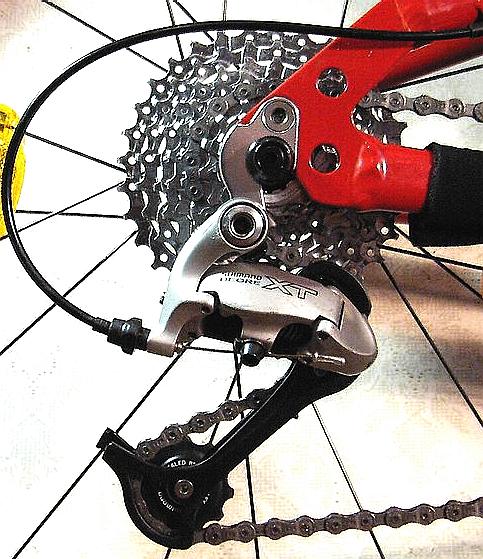


Solar
Spice - the healthier performance alternative
|






